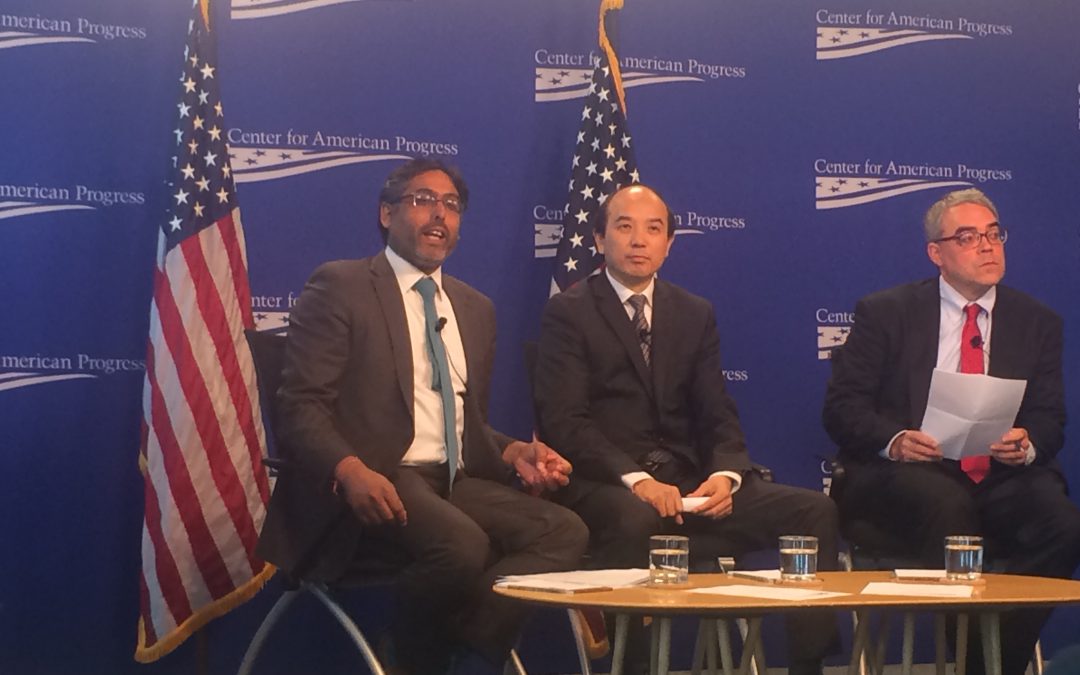WASHINGTON – Although both presidential candidates have been tough on China over trade, U.S.-China relations have not been damaged by the campaign rhetoric yet, China experts say, but that could change after Nov. 8 because Donald Trump represents a break with current China policy that Hillary Clinton would likely follow.
During the campaign, Hillary Clinton has accused China of cheating and dumping cheap steel illegally into American markets. She also opposes recognizing China as a market economy. Donald Trump has accused China of manipulating its currency and stealing American jobs, and has said he would make better trade deals as president.
Sara Hsu, assistant professor of economics at the State University of New York at New Paltz said the Chinese government has taken steps recently to prop up its currency value as it depreciated, which contradicts Trump’s claims. Richard Bush, director of the Center for East Asia Policy Studies at the Brookings Institution, said Clinton’s steel dumping claim is legitimate because China is dumping steel all over the world.
Clinton is seen as a “source of continuity,” whereas Trump is seen as disruptive, according to Bush.
In what Bush called one of Clinton’s most comprehensive speeches on China policy, Clinton stated at the U.S. Institute of Peace China Conference in March of 2012 that the U.S. must hold China accountable for human rights violations and discrimination against U.S. firms, but America also needs to work together with China for mutual economic success.
“Without China and the United States, I doubt that any of our global problems can be solved,” Clinton said in the speech.
Bush said the Chinese believe they understand Clinton and the people around her well, but Trump is a different story.
“The election for the first time in a long time created in China a sense that …the election might totally reshuffle the deck of how American leaders address foreign policy,” Bush said.
Hsu said if Trump carried out his promises to impose high tariffs and reduce trade with China, “I think certainly foreign relations would suffer.”
Vikram Singh, national security vice president at the left-leaning Center for American Progress, said recently that “in the political campaign in the United States, there has been a lot of, I think what you can call, China bashing, and a lot of anti-trade sentiment, which is deeply felt, it is not just a small thing.”
But Hsu said the Chinese have been “amused by the election” and “have tried really consciously not to let if affect their relationship.”
Although the election has brought up many points of contention in the U.S.-China relationship, many experts are focusing on the points of cooperation. Last Tuesday, the Center for American Progress released a report that gave recommendations for U.S.-China cooperation in Southeast Asia.
The report details key shared interests, including the economy, the environment, and protecting Southeast Asian countries’ security, and it recommends expanding U.S.-China cooperation to include Southeast Asia countries in fishery, ocean sustainability, ocean security, climate collaboration, and infrastructure development.
Yuan Peng, vice president of the China Institutes for Contemporary International Relations and an author of the report, said the U.S. and China are “in a very critical moment” in determining how to deal with cooperation and conflict.
“When people talk about the United States and China and Southeast Asia,” said Melanie Hart, China policy director at the Center for American Progress and another report author, “they generally talk about competition and conflict, not cooperation. Many people think first and foremost and sometimes only about the South China Sea.”
Bush, however, said growing U.S.-China cooperation on risk reduction measures to prevent conflict between U.S. and Chinese naval ships and airplanes in the South China Sea was a highly significant area of cooperation that was underreported during the Obama administration.
Bush called North Korea’s containment an important but difficult shared interest.
Hsu highlighted trade as another major source of cooperation. She said the U.S. private sector wants to invest more in China, but China will need to open its services sector further. In addition, China is holding a lot of American debt, she said, while the U.S. financial sector sees China as an important place for investment. Hsu said she doesn’t believe those areas would grow in a Trump administration.
The Obama administration focused on a “rebalance to Asia,” especially in trade and security. A key example is the Trans-Pacific Partnership, a trade deal spanning across the Pacific, including some of China’s neighbors, the U.S., as well as some Latin American countries. China is not part of the deal. In 2012, then-Secretary of State Clinton had invited China to join negotiations on the condition it could meet TPP standards.
Both Clinton and Trump oppose TPP. Bush said if TPP doesn’t get congressional approval, China could create a bloc of allies in Southeast Asia, with economies increasingly dependent on the Chinese economy, which Bush said would not be good for China, Southeast Asia or the United States.
In the end, Bush said, the relationship between the leaders of the two countries is what will matter the most in the areas of conflict and cooperation.
“I think the most important thing is that the two leaders have a shared understanding of why the relationship is important for their respective countries, and why we should expand the area of common interests and cooperation, and also manage areas of friction,” he said.


